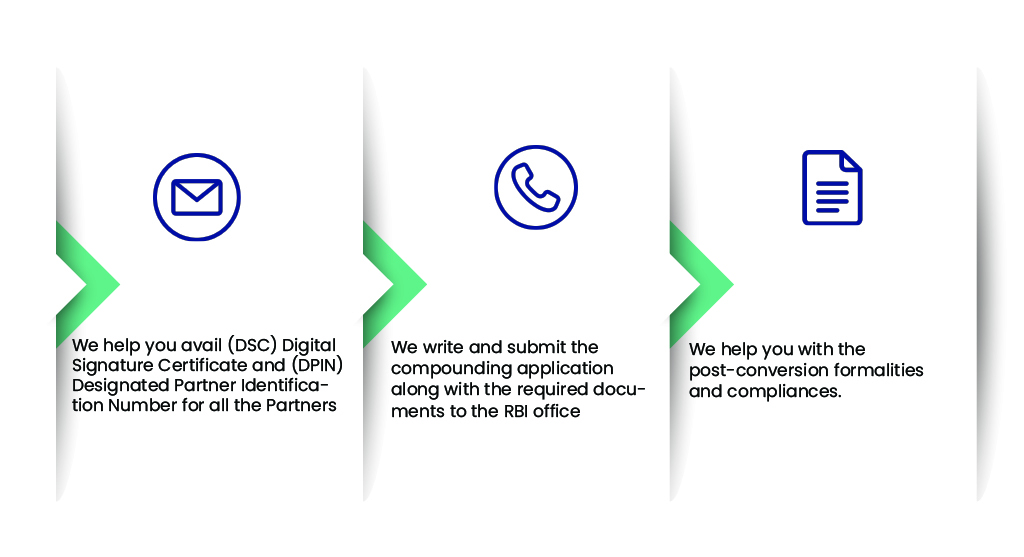
Convert a Sole Proprietorship to Private Limited Company
A Private Limited Company is the most popular type of corporate entity in India. For converting a sole partnership to a Private Limited Company (PLC), you need to submit an agreement between the sole proprietor and the PLC, declaring the transfer of all the assets to the latter.
How To Convert A Sole Proprietorship To Private Limited Company?
Here, is how we help you convert a Sole Proprietorship to Private Limited Company –

Sole Proprietorship to Private Limited Company in just 7 Days

Documents Required from Directors, Shareholders
- Pan Card Copy (Mandatory)
- ID Proof (Any one) – Driving License/ Voter ID/ Passport Copy/ Aadhaar Card
- Address Proof – Latest Bank Statement/ Latest Telephone or Mobile Bill/ Latest Electricity Bill.(MUST be less than 30 days old)
- Passport Size Photograph

Documents Required for Registered Office Address
- NOC – No Objection Certificate from the Owner of the Property
- Address Proof – Latest Telephone Bill or Mobile Bill/ Gas Bill/ Electricity Bill (MUST be less than 30 days old)
Overview
In India, many entrepreneurs initially start their business as a sole proprietorship because of its low compliance requirements. After certain years, the business will boom and the revenues involved will become more.
Now, in order to limit the liability and to detach the bank accounts and tax filing of an individual, a sole proprietorship firm will be converted to a private limited company.
By converting a sole proprietorship firm to a private limited company, which becomes a separate legal entity thereby reducing the risk of liability and the personal assets will remain untouched except in case of fraud.
The private limited company will be governed under the companies act, 2013, and the shares are held privately not offered to the public. Similarly, the structure of taxation will be unique under income tax act, 1961, and different from the sole proprietorship, which considers the income as individual income.
Benefits of Registering a private company in India
A person has to fulfill the specific requirements in case he wants to enrol himself as a designated partner with an LLP. Let us have a look at some of the primary requirements to be eligible to become a designated partner in an LLP:
- The individual must be at least 18 years old.
- Any individual or body corporate can be eligible to be a partner in an LLP.
- The individual who wishes to become a partner must have a unique identification number (For instance, Aadhaar Card)
- Every LLP must have a minimum of two designated partners.
- The person should be in a sound mind.
- The person shouldn’t be involved in fraudulence.
- There is no maximum limit for the number of partners in a limited liability partnership.
- At least one designated partner must be an Indian national who resides in India.
- The other Designated Partners must also provide a consent letter stating their proof and other documents.
- The individual should not have adjudged bankruptcy in the last 5 years.
- One who has not properly closed the payment settlements with any creditors in the last 5 years and also haven’t made an agreement regarding the same with them.
In case if the partner has changed his/her name or address, then the partner shall inform the LLP of any modification made in his/her name or address within a period of 15 days of such revision. It’s the LLP firm’s responsibility to file such details with the Registrar within 30 days of such a change in the Form 4.
Checklist for Registering a Company in India
As per the rules and regulations of Company Act, 2013, in order to incorporate any company to be registered in India, the below conditions have to be met.
Two Directors
- A private limited company must have at least two directors and at most, there can be 15. Of the directors in the business, at least one must be a resident of India.
Unique Name
- The name of your business must be unique. The suggested name should not match with any existing companies or trademarks in India.
Minimum Capital Contribution
- There is no minimum capital amount for a company. A company should have an authorized capital of at least Rs. 1 lakh.
Registered Office
- The registered office of a company does not have to be a commercial space. Even a rented home can be the registered office, as long as an NoC is obtained from the landlord.
Memorandum Of Association( MOA)
- In the objective clause of Memorandum Of Association (MOA), there should be a phrase present “ the takeover or acquisition of a sole proprietorship concern”.
Annual returns
- The private limited company should file an annual financial accounts statement and annual returns with the registrar of the company every year.
How to Register a Company Online? - A detailed registration process?
Company Registration in India will boost the progress of startups and provide an additional edge over those who have not registered. The Ministry of Corporate Affairs governs the company registration process with rules and regulations framed in accordance with the law.
Conditions to be followed prior converting a sole proprietorship to private limited company
- After incorporating a new private limited company, all the assets and liabilities of the old sole proprietorship will be completely transferred to the company.
- Even after the conversion takes place, the old sole proprietorship will hold 50% of shares in a new private limited company. i.e 50% of the voting rights will be held by a sole proprietorship.
- The old sole proprietor will hold shares for a minimum period of 5 years from the date of incorporation of a new private limited company.
- Similarly, there will not be any monetary consideration between a sole proprietorship and private limited company as it is a mere conversion, not sale.
Step by step procedure for registration
- Step 1: Application for DSC (Digital Signature Certificate).
- Step 2: Apply for the DIN (Director Identification Number)
- Step 3: Application for the name availability.
- Step 4: Filing of the EMOA and EAOA to register a private limited company
- Step 5: Apply for the PAN and TAN of the company
- Step 6: Issued certificate of incorporation by RoC with PAN and TAN
- Step 7: Opening a current bank account on the company name
How can we help in Registering your Company in India?
The Private Limited Company Registration process is completely online, so you don’t even have to leave your home to get your entity registered. At Finnsdom, we complete the Company Registration online within 14 days.
Finnsdom Company Registration package includes:
- DIN and DSC for two Directors
- Drafting of MoA & AoA
- Registration fees and stamp duty
- Company Incorporation Certificate
- Company PAN and TAN
- Zero Balance Current Account – Powered by DBS Bank *
Documents required for Online Registration of the company
In India, Private Limited company registration cannot be done without proper identity proof and address proof. Identity and address proof will be needed for all the directors and the shareholders of the company to be incorporated. Listed below are the documents that are accepted by MCA for the online company registration process acceptable.
Identity And Address Proof
- Scanned copy of PAN Card or Passport (Foreign Nationals & NRIs)
- Scanned copy of Voter’s ID/Passport/Driver’s License
- Scanned copy of the electricity or gas bill.
- Scanned passport-sized photograph specimen signature (blank document with signature [directors only])
For the foreign nationals, an apostilled or notarized copy of the passport has to be submitted mandatorily. All documents submitted should be valid. The residence proof documents like the bank statement or the electricity bill must be less than 2 months old.
Registered Office Proof
For online company registration in India, the company must have a registered office in India. To prove admittance to the registered office, a recent copy of an electricity bill or the property tax receipt or water bill must be submitted. Along with the rental agreement, utility bill or the sale deed and a letter from the landlord with her/his consent to use the office as a registered office of the company should be submitted.
- Scanned copy of the electricity or gas bill
- Scanned copy of Notarized rental agreement in English
- Scanned copy of No-objection certificate from the property owner
- Scanned copy of sale deed/property deed in English (in case of owned property)
E-Form spice 32
It is an incorporation e-form provided at the final stage of in corporation of a company. Here, all the mandatory details should be filled in this form and submitted along with the required documents.
Why Finnsdom
1K Companies Per Month
We execute legal work for over 1000 companies and LLPs every month, by leveraging our tech capabilities, and the expertise of our team of legal professionals. Come on board and experience the ease and convenience!Realistic Expectations
By handling all the paperwork, we ensure a seamless interactive process with the government. We provide clarity on the incorporation process to set realistic expectations. So you can start your company registration process at ₹499/-.Get Started at
₹ 499/-
FAQs on Convert a Sole Proprietorship to Private Limited Company
YES, any individual can start a company who is of Indian origin/Non Resident Indian( NRI)/ Overseas Citizen of India(OCI)/ Person of Indian Origin(PIO). Even any foreign nationals can also start a company in India with the mandatory documents. But there should be a minimum of 2 directors and a maximum of upto 200 directors.
Usually, after submitting all the relevant documents to the Register of Companies (ROC), it will take around 20-25 days to get incorporated. If there is any imperfection in the submitted documents then the processing time would be a bit longer.
Yes, After acquiring the Director Identification Number(DIN) from the government of India, any foreign national can become/ act as director of the company.

